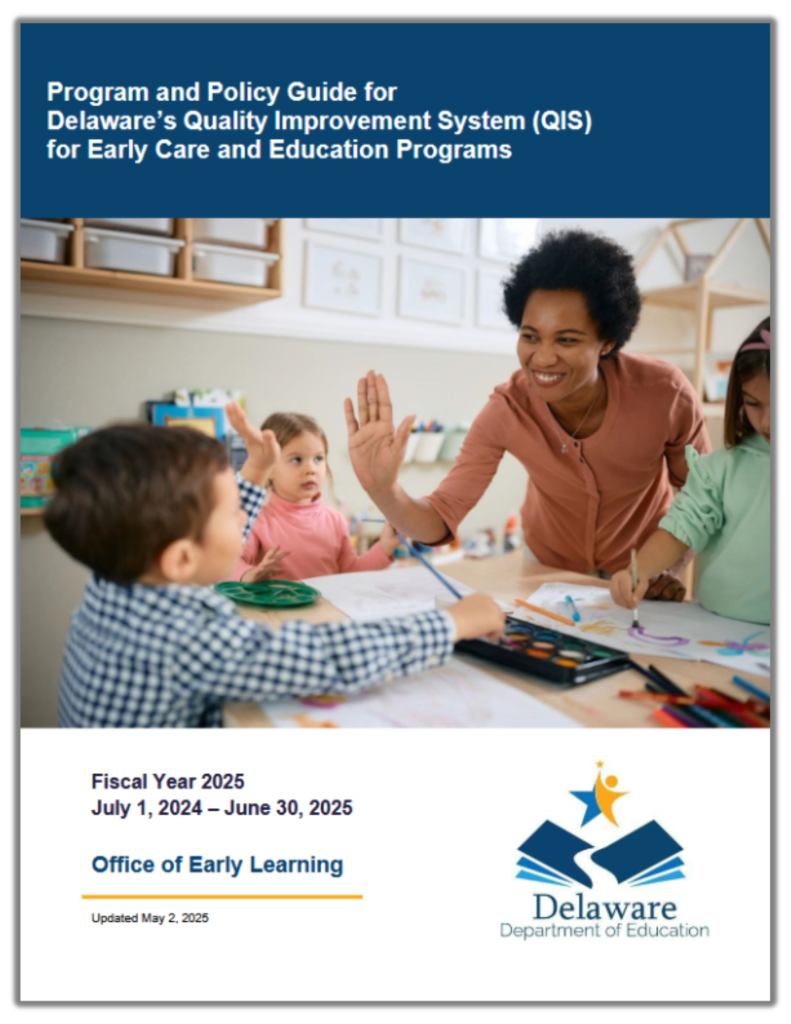The Delaware Department of Education, Office of Early Learning has released the FY25 Program and Policy Guide for Delaware’s Quality Improvement System (QIS) for Early Care and Education Programs.
We’ve also created a Quick Guide to the changes made to QIS processes and policy for Fiscal Year 2025.
Delaware’s revised Quality Improvement System (QIS) includes three Quality Indicators that represent broad content areas. Each Quality Indicator includes a set of Key Practices that help to define the Quality Indicator. Quality Indicators and Key Practices for both early childhood center-based programs and family child care programs can be viewed below.
Early Childhood Center-Based Quality Indicators & Key Practices
Programs implement policies, procedures, and systems that support children, families, and early childhood professionals in the provision of early care and education.
Key Practices
Programs create culturally responsive, playful learning environments, using intentional and responsive interactions to promote relationships between educators and children and build a sense of community, while using developmentally-appropriate approaches to support each child’s learning and development.
Key Practices
Programs promote families in their roles as their child’s first teacher and engage in collaborative relationships with community organizations to holistically support children and their families.
Key Practices
Early Childhood Family Child Care Quality Indicators & Key Practices
Programs implement policies, procedures, and systems that support children, families, and early childhood professionals in the provision of early care and education.
Key Practices
Programs create culturally responsive, playful learning environments, using intentional and responsive interactions to promote relationships between educators and children and build a sense of community, while using developmentally-appropriate approaches to support each child’s learning and development.
Key Practices
Programs promote families in their roles as their child’s first teacher and engage in collaborative relationships with community organizations to holistically support children and their families.
Key Practices
Like your program, Delaware Stars is in a continuous quality improvement cycle. We use what we’ve learned to improve the system to support you in providing quality care and education.
To formally evaluate the Delaware Stars system, Delaware contracted with the RAND Corporation from 2013-2016 to conduct an independent evaluation. Additionally, we looked at other states’ QIS to gain insights on Delaware Stars.
Here are some of the key learnings:
- Program quality increased modestly as star levels increased.
- FCCs tended to have higher quality scores.
- Children’s executive functioning skills were modestly higher in star level 5 programs
- Management & Administration and Qualifications & Professional Development domains moderately (positively) related to children’s cognitive skills.
- We need to pay more attention to workforce issues.
- Program and classroom quality measurement needs improvement.
- We may be leaving out important quality variables such as– children’s engagement, continuity, stability, etc.
Revision Reference Materials (for previously-named QRIS):
- QRIS Revision Introduction
OEL presentation to introduce the revision process and share collected data with stakeholders. - Revision Report 1
A summary of initial stakeholder feedback on Delaware’s current QRIS. - Research Synthesis
Overview of QRIS and recommendations for Delaware’s QRIS revision. - Structural Recommendation Information Sessions
OEL presentation to share and gather feedback on the proposed structural changes to the QRIS model. - Revision Report 2
Summary of feedback on the initial draft proposal for structural changes gathered during information sessions. - Delaware Theory of Change
This is the Theory of Change for the Delaware Early Childhood Education Systems with a specific focus on the Stars revision process.
Past QRIS Updates:
Revision Goals
Following are the goals that are guiding the revision.
- Ratings are closely aligned to factors proven to improve and sustain child, family, workforce, and program outcomes.
- The Stars system incorporates multiple indicators of program quality.
- Each level of Stars incorporates a cycle of Continuous Quality Improvement (CQI).
- Equity and inclusion are demonstrated throughout the Stars system.
- The financial incentive and provider support structures are revised to better meet the needs of all programs and support CQI.
- Further align early childhood systems and create/improve data linkages.
Your input is vital for the revision and its implementation to be successful.
QIS Comment Box
If you have any questions, comments, or concerns, please leave us a comment in the box below. Your name and email will not be published.



